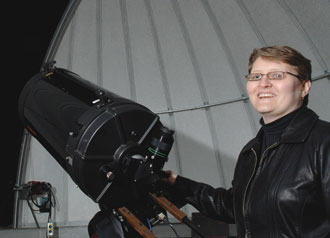Don't Fear the Science, Turner Urges Students

College students can do some risky things.
Like snowboarding down the side of a mountain. Or eating those slightly funky leftovers from the back of the refrigerator.
Associate Provost Paula Turner wants students to consider something that some may find even riskier: taking one of those supposedly geeky, difficult science classes.
"A lot of incoming students are afraid they can't figure some of that science stuff out," Turner says. "They want to stick with subjects they're comfortable with. We have to help them take the next step and become unafraid of these intellectual risks."
Turner, who is also an associate professor of physics, sees her mission as getting students at Kenyon--and even those much younger--to appreciate and learn about science, in part to help develop informed and aware citizens.
The stakes couldn't be higher, Turner says.
In our technological society, science touches more aspects of our lives than ever before. In order to become informed citizens, we need a basic level of science literacy, even if we never intend to be scientists, she says.
Take just one example from today's headlines. Nearly everyone is worried about the high cost of fuel, and alternative energy sources such as nuclear, solar, and ethanol fuels are all touted as possible ways to gain our energy freedom.
"Where should we spend our resources if we want to become less dependent on foreign oil sources?" Turner asks. "That's a question where science has something to offer and where all citizens should know enough to evaluate the choices we have available."
One way to help students overcome their insecurities about science, Turner says, is to connect these important societal issues to the science behind them. Kenyon offers science courses that try to do just that. For example, the physics department offers the course "Good Nukes, Bad Nukes," which is designed "to give students the scientific knowledge necessary to understand and participate in public discussions of nuclear issues."
Students learn core concepts of nuclear energy, which allows them to consider contemporary issues such as electric power generation using nuclear energy, including its environmental effects; advances in nuclear medicine; the challenges of preventing nuclear weapons proliferation; the threat from "dirty bombs"; and dating the origin of the universe.
Turner says one of the keys to promoting scientific literacy is to expose students to the scientific method. In other words, all students--not just science majors--should learn what it means to develop a hypothesis and test it in the real world.
One example is Kenyon's "Origins" course, which considers how everything from life on Earth to the universe itself came into being. In one of the labs, students look at natural selection in a creative way. The students make paper airplane models and see how far they fly. They then change one element--say, make the wings a bit wider--and see how that changes the airplane's performance.
"They are essentially doing little evolution experiments in a way that is fun and interesting," Turner says.
"We need to tap students' natural curiosity about the world. Anyone with a smidge of curiosity can learn more than they think they can about science. Our goal should always be to help students take the next step-learn more about science than they thought they were able to."
But interest in science needs to be cultivated long before college, she says. Kenyon is also involved in a program, funded by a grant from Howard Hughes Medical Institute, in which college faculty--including Turner--work with Mount Vernon and Knox County middle-school teachers to create hands-on science activities with their students. This "inquiry-based" science allows students to do simple experiments that give them insight into how the world works.
"This is an approach that you can't get from a textbook, but one that lets kids use their imagination and reason."
Turner says it comes down to reducing the intimidation factor of science education and finding ways to connect students with their natural curiosity.
And if a pep talk will help convince a student to enroll in a science class, Turner is more than happy to deliver:
"Maybe you had an experience with a science class that didn't go well for you--well, dive back in, give it another try. You're a smart person; you can do this," she says.
Do you have feedback on this page?
